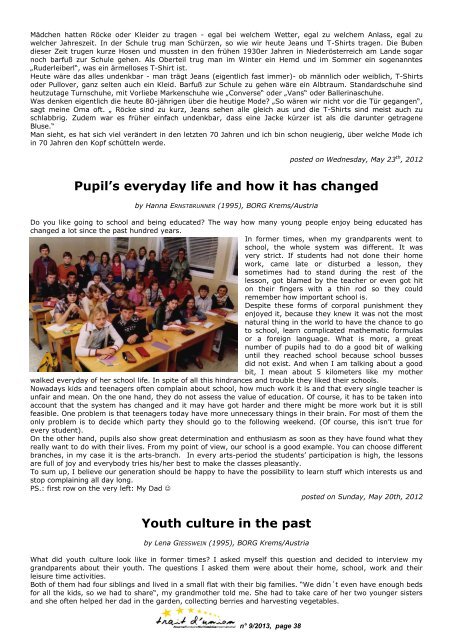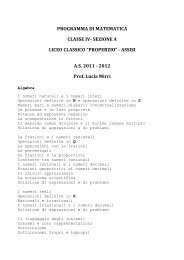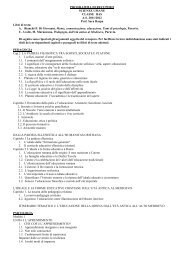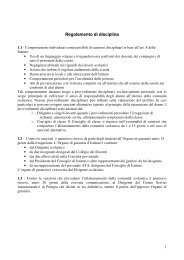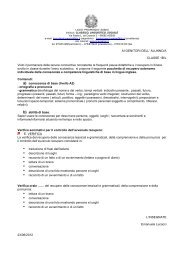The World is Changing - Liceo Sesto Properzio
The World is Changing - Liceo Sesto Properzio
The World is Changing - Liceo Sesto Properzio
Sie wollen auch ein ePaper? Erhöhen Sie die Reichweite Ihrer Titel.
YUMPU macht aus Druck-PDFs automatisch weboptimierte ePaper, die Google liebt.
Mädchen hatten Röcke oder Kleider zu tragen - egal bei welchem Wetter, egal zu welchem Anlass, egal zuwelcher Jahreszeit. In der Schule trug man Schürzen, so wie wir heute Jeans und T-Shirts tragen. Die Bubendieser Zeit trugen kurze Hosen und mussten in den frühen 1930er Jahren in Niederösterreich am Lande sogarnoch barfuß zur Schule gehen. Als Oberteil trug man im Winter ein Hemd und im Sommer ein sogenanntes„Ruderleiberl“, was ein ärmelloses T-Shirt <strong>is</strong>t.Heute wäre das alles undenkbar - man trägt Jeans (eigentlich fast immer)- ob männlich oder weiblich, T-Shirtsoder Pullover, ganz selten auch ein Kleid. Barfuß zur Schule zu gehen wäre ein Albtraum. Standardschuhe sindheutzutage Turnschuhe, mit Vorliebe Markenschuhe wie „Converse“ oder „Vans“ oder Ballerinaschuhe.Was denken eigentlich die heute 80-jährigen über die heutige Mode? „So wären wir nicht vor die Tür gegangen“,sagt meine Oma oft. „ Röcke sind zu kurz, Jeans sehen alle gleich aus und die T-Shirts sind me<strong>is</strong>t auch zuschlabbrig. Zudem war es früher einfach undenkbar, dass eine Jacke kürzer <strong>is</strong>t als die darunter getrageneBluse.“Man sieht, es hat sich viel verändert in den letzten 70 Jahren und ich bin schon neugierig, über welche Mode ichin 70 Jahren den Kopf schütteln werde.posted on Wednesday, May 23 th , 2012Pupil’s everyday life and how it has changedby Hanna ERNSTBRUNNER (1995), BORG Krems/AustriaDo you like going to school and being educated? <strong>The</strong> way how many young people enjoy being educated haschanged a lot since the past hundred years.In former times, when my grandparents went toschool, the whole system was different. It wasvery strict. If students had not done their homework, came late or d<strong>is</strong>turbed a lesson, theysometimes had to stand during the rest of thelesson, got blamed by the teacher or even got hiton their fingers with a thin rod so they couldremember how important school <strong>is</strong>.Despite these forms of corporal pun<strong>is</strong>hment theyenjoyed it, because they knew it was not the mostnatural thing in the world to have the chance to goto school, learn complicated mathematic formulasor a foreign language. What <strong>is</strong> more, a greatnumber of pupils had to do a good bit of walkinguntil they reached school because school bussesdid not ex<strong>is</strong>t. And when I am talking about a goodbit, I mean about 5 kilometers like my motherwalked everyday of her school life. In spite of all th<strong>is</strong> hindrances and trouble they liked their schools.Nowadays kids and teenagers often complain about school, how much work it <strong>is</strong> and that every single teacher <strong>is</strong>unfair and mean. On the one hand, they do not assess the value of education. Of course, it has to be taken intoaccount that the system has changed and it may have got harder and there might be more work but it <strong>is</strong> stillfeasible. One problem <strong>is</strong> that teenagers today have more unnecessary things in their brain. For most of them theonly problem <strong>is</strong> to decide which party they should go to the following weekend. (Of course, th<strong>is</strong> <strong>is</strong>n’t true forevery student).On the other hand, pupils also show great determination and enthusiasm as soon as they have found what theyreally want to do with their lives. From my point of view, our school <strong>is</strong> a good example. You can choose differentbranches, in my case it <strong>is</strong> the arts-branch. In every arts-period the students’ participation <strong>is</strong> high, the lessonsare full of joy and everybody tries h<strong>is</strong>/her best to make the classes pleasantly.To sum up, I believe our generation should be happy to have the possibility to learn stuff which interests us andstop complaining all day long.PS.: first row on the very left: My Dad posted on Sunday, May 20th, 2012Youth culture in the pastby Lena GIESSWEIN (1995), BORG Krems/AustriaWhat did youth culture look like in former times? I asked myself th<strong>is</strong> question and decided to interview mygrandparents about their youth. <strong>The</strong> questions I asked them were about their home, school, work and theirle<strong>is</strong>ure time activities.Both of them had four siblings and lived in a small flat with their big families. “We didn´t even have enough bedsfor all the kids, so we had to share“, my grandmother told me. She had to take care of her two younger s<strong>is</strong>tersand she often helped her dad in the garden, collecting berries and harvesting vegetables.n° 9/2013, page 38


